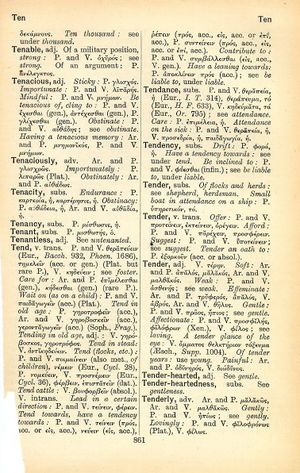tend: Difference between revisions
(Woodhouse 5) |
(CSV5) |
||
| Line 1: | Line 1: | ||
{{ | {{Woodhouse1 | ||
| | |Text=[[File:woodhouse_861.jpg|thumb|link={{filepath:woodhouse_861.jpg}}]]'''v. trans.''' | ||
P. and V. θεραπεύειν (Eur., <b class="b2">Bacch.</b> 932, ''Phoen.'' 1686), τημελεῖν (acc. or gen.) (Plat. but rare P.), V. κηδεύειν; see [[foster]]. | |||
<b class="b2">Care for</b>: Ar. and P. ἐπιμέλεσθαι (gen.), κήδεσθαι (gen.) (rare P.). | |||
<b class="b2">Wait on</b> (<b class="b2">as on a child</b>): P. and V. παιδαγωγεῖν (acc.) (Plat.). | |||
<b class="b2">Tend in old age</b>: P. γηροτροφεῖν (acc.), Ar. and V. γηροβοσκεῖν (acc.), γερονταγωγεῖν (acc.) (Soph., <b class="b2">Frag.</b>). | |||
<b class="b2">Tending in old age</b>, adj.: V. γηρόβοσκος, γηροτρόφος. | |||
<b class="b2">Tend in stead</b>: V. ἀντικηδεύειν. | |||
<b class="b2">Tend</b> (<b class="b2">flocks, etc.</b>): P. and V. ποιμαίνειν (also Met., <b class="b2">of children</b>), νέμειν (Eur., ''Cycl.'' 28), P. νομεύειν, V. προσνέμειν (Eur., ''Cycl.'' 36), φέρβειν, ἐπιστατεῖν (dat.). | |||
<b class="b2">Tend cattle</b>: V. βουφορβεῖν (absol.). | |||
V. intrans. <b class="b2">Lead in a certain direction</b>: P. and V. τείνειν, [[φέρω|φέρειν]]. | |||
<b class="b2">Tend towards, have a tendency towards</b>: P. and V. τείνειν ([[πρός]], acc. or εἰς, acc.), νεύειν (εἰς, acc.), ῥέπειν ([[πρός]], acc., εἰς, acc. or ἐπί, acc.), P. συντείνειν ([[πρός]], acc., εἰς, acc. or ἐπί, acc.). | |||
<b class="b2">Contribute to</b>: P. and V. συμβάλλεσθαι (εἰς, acc., V. gen.). | |||
<b class="b2">Have a leaning towards</b>: P. ἀποκλίνειν [[πρός]] (acc.); see <b class="b2">be liable to</b>, under [[liable]]. | |||
}} | }} | ||
Revision as of 10:05, 21 July 2017
English > Greek (Woodhouse)
v. trans.
P. and V. θεραπεύειν (Eur., Bacch. 932, Phoen. 1686), τημελεῖν (acc. or gen.) (Plat. but rare P.), V. κηδεύειν; see foster.
Care for: Ar. and P. ἐπιμέλεσθαι (gen.), κήδεσθαι (gen.) (rare P.).
Wait on (as on a child): P. and V. παιδαγωγεῖν (acc.) (Plat.).
Tend in old age: P. γηροτροφεῖν (acc.), Ar. and V. γηροβοσκεῖν (acc.), γερονταγωγεῖν (acc.) (Soph., Frag.).
Tending in old age, adj.: V. γηρόβοσκος, γηροτρόφος.
Tend in stead: V. ἀντικηδεύειν.
Tend (flocks, etc.): P. and V. ποιμαίνειν (also Met., of children), νέμειν (Eur., Cycl. 28), P. νομεύειν, V. προσνέμειν (Eur., Cycl. 36), φέρβειν, ἐπιστατεῖν (dat.).
Tend cattle: V. βουφορβεῖν (absol.).
V. intrans. Lead in a certain direction: P. and V. τείνειν, φέρειν.
Tend towards, have a tendency towards: P. and V. τείνειν (πρός, acc. or εἰς, acc.), νεύειν (εἰς, acc.), ῥέπειν (πρός, acc., εἰς, acc. or ἐπί, acc.), P. συντείνειν (πρός, acc., εἰς, acc. or ἐπί, acc.).
Contribute to: P. and V. συμβάλλεσθαι (εἰς, acc., V. gen.).
Have a leaning towards: P. ἀποκλίνειν πρός (acc.); see be liable to, under liable.

